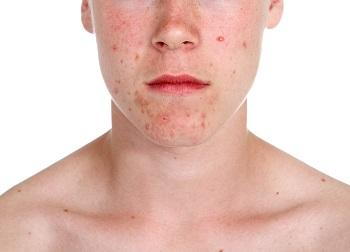 Acne is by far the most common skin complaint among teenagers, affecting nearly all of those between the ages of 12 and 17 at least occasionally, according to the American Academy of Dermatology. In most cases, hormones released during puberty are responsible for the appearance of blemishes during the teen years. These hormones stimulate the skin’s sebaceous (oil) glands, producing oily skin that is more prone to breakouts. Because teens are extremely conscious of their image and appearance, an acne outbreak can be emotionally devastating.
Acne is by far the most common skin complaint among teenagers, affecting nearly all of those between the ages of 12 and 17 at least occasionally, according to the American Academy of Dermatology. In most cases, hormones released during puberty are responsible for the appearance of blemishes during the teen years. These hormones stimulate the skin’s sebaceous (oil) glands, producing oily skin that is more prone to breakouts. Because teens are extremely conscious of their image and appearance, an acne outbreak can be emotionally devastating.
While hormonal changes during puberty cause many types of acne to be unavoidable, with a diligent skincare regimen, many teens can help control breakouts from becoming severe, minimize the appearance of blemishes and prevent scarring. The good news is that acne goes away almost completely for most people by the time they are out of their teens.
- Keep skin clean. Teens produce more oil, so it’s important to wash the face every day with warm water and a mild cleanser to remove excess surface oils and dead skin cells. Always remove makeup before going to bed to avoid clogging pores.
- Avoid over washing. Harsh scrubbing can lead to dry, irritated skin which can actually increase inflammation and trigger glands to produce more oil.
- Don’t pick. Squeezing and picking at acne can make breakouts worse. Picking at blemishes can also lead to greater inflammation and infection, increasing the risk for scarring.
- Keep hands off. Avoid touching the face throughout the day as the oils on hands can drive bacteria into the pores.
- Use oil-free products. Avoid oil-based makeup. Instead look for products that are noncomedogenic or non-acnegenic.
- Shower after sports or physical activities. Sweat and oil can settle on the skin’s surface trapping dirt and bacteria in the pores.
- Visit your pediatrician or dermatologist. Most cases of mild acne can be controlled and improved with a good skincare routine at home. If your skin problems persist, visit your pediatrician for professional treatment.
Being a teenager is tough enough without having to worry about breakouts. The good news is that effective treatments are available for acne — and the earlier treatment is started, the lower a teen’s risk of lasting physical and emotional damage. Take your teen to a dermatologist or pediatrician who can provide feedback on the cause, type and severity of acne. Your pediatrician can make recommendations for medications and regimens based on your teen's unique skin type.








